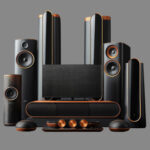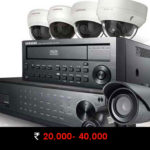Nothing unites a family like an extraordinary film, Program, or season finisher game in a comfortable home cinema. Out of nowhere, your home is the cool house, and a blustery Saturday night at home is everybody’s best option.
The uplifting news? There are incalculable varieties – from top-of-the-line home venues deserving of an Elite Hollywood movie chief to entirely reasonable varieties that can fit in an extra room yet at the same time take your breath away. Add all the network choices (how home performance centres with such ease stream content as well as transform each room into a music room), and your home venue turns into an interest in satisfaction.
With this aid, you’ll get familiar with the intricate details of home cinemas. Furthermore, assuming that you actually have inquiries toward its finish, we’re here to help. So moving along, how about we dive in?
The best home cinema system can provide an immersive and exciting entertainment experience right in the comfort of your own home. However, setting up a home cinema can be a daunting task, especially for those who are new to the world of home audio and video. Earlier days home cinema 7.1 was most popular. Now there are many in this gadget.
In this article, we will answer some of the most frequently asked questions about home cinemas to help you make an informed decision and create the ultimate home entertainment setup.
Q: What is a home cinema system?
A: A home cinema system is a combination of audio and video equipment that replicates the experience of watching movies in a movie theater. A typical home cinema setup includes a large-screen television or projector, a surround sound speaker system, a Blu-ray player or streaming device, and a home cinema receiver to manage and control all of the components.
Q: What components do I need for a home cinema system?
A: The components you need for a home cinema system will depend on your budget and preferences. However, a typical home cinema setup includes the following:
- ● A large-screen television or projector
- ● A surround sound speaker system
- ● A home theatre AV receiver
- ● A Blu-ray player or streaming device
- ● Speaker stands or wall mounts
- ● HDMI cables and other connectors
The best home cinema dealers in Trivandrum have all the varieties of components required for a home cinema system.
Q: How many speakers do I need for a home cinema system?
A: A typical home cinema system includes five speakers: a center channel speaker, two front left and right speakers, and two surround left and right speakers. However, some
systems may include additional speakers, such as a subwoofer for enhanced bass or rear surround speakers for a more immersive experience.
Q: What is the best size screen for a home cinema?
A: The best size screen for the best home cinema for a home depends on the size of your room and your personal preferences. As a general rule, the viewing distance should be 1.5 to 2.5 times the screen height. For example, if you have a 60-inch screen, the ideal viewing distance would be between 90 and 150 inches.
Q: What is the difference between a home cinema receiver and an AV receiver?
A: A home cinema receiver and an AV receiver are similar in many ways, but there are some key differences. A home cinema receiver is designed specifically for home cinemas and includes features such as audio processing, video switching, and connectivity for speakers and other components. An AV receiver, on the other hand, is a more versatile device that can handle audio and video for a variety of applications, including home cinemas, stereo systems, and whole-house audio.
The best home cinema installers in Trivandrum will explain you the differences when you purchase from their store.
Q: What is the difference between a 9.2.2 and 7.2 home cinema system?
A: As a customer looking to enhance your home entertainment experience, understanding the nuances between these two setups can help you make an informed decision. Both systems boast impressive audio capabilities, but there are key distinctions that can influence your choice based on your specific needs and preferences.
| Specifications | home cinema system 9.2.2 | home cinema system 7.2 |
| About the model | The 9.2.2 system takes it a step further with two additional channels and two height speakers.● This means that in addition to the seven standard audio channels and two subwoofers, there are two more channels dedicated to delivering audio to speakers placed above the standard ear level, enhancing the vertical dimension of the sound.● The incorporation of height speakers allows for a more encompassing audio experience, particularly with formats like Dolby Atmos and DTS:X, which are designed to create a three-dimensional sound environment. | The “7.2” designation refers to the number of channels and subwoofers in the setup.● In a 7.2 system, you have seven audio channels and two subwoofers. The channels are responsible for delivering audio to different speakers, creating a multi-dimensional soundstage that immerses you in the audio experience.● The inclusion of two subwoofers contributes to more evenly distributed bass across the listening area, resulting in a more robust and impactful low-frequency performance. |
| Advantages | ● The 9.2.2 system’s inclusion of | ● One of the advantages of the |
| height speakers introduces a new layer of audio immersion that can be particularly effective in larger rooms, providing a more encompassing sound experience. The height speakers create a sense of sound coming from above, adding a new dimension to movies, music, and games, especially when paired with content designed for object-based audio formats. | 7.2 system lies in its relative simplicity and cost-effectiveness. It provides a substantial audio upgrade from standard setups without delving into the complexities of additional speakers and channels.● The 7.2 configuration is well-suited for medium-sized rooms, delivering an immersive audio experience without overwhelming the space. |
The differences between home theatre 7.2 and 9.2.2 systems largely revolve around the number of speakers, channels, and the inclusion of height speakers. By carefully considering your space and audio needs, you can select the system that best complements your home entertainment setup, ensuring an engaging and lifelike audio experience for all your content. The best home cinema dealers in Trivandrum will guide you and make the best choice as per your needs.
Q: Which one has the better audio between the choice between a 7.2 and a 9.2.2 ?
A: The choice between a 7.2 and a 9.2.2 system hinges on your specific requirements, the size of your room, and your commitment to achieving a truly immersive audio experience. Both setups offer impressive audio performance, but the 9.2.2 system goes the extra mile in delivering a more spatially accurate and enveloping audio experience, especially when paired with compatible content.
Q: How do I calibrate my home cinema system?
A: Calibrating your home cinema system involves adjusting the audio and video settings to optimize the performance of your equipment. Most home cinema receivers include an auto-calibration feature that can automatically adjust the audio settings based on the size and shape of your room. For video calibration, you may need to adjust the picture settings on your television or projector.
The best home cinema dealers in Trivandrum will calibrate speakers as per your needs and customise them on installation.
Q: Can I use wireless speakers for my home cinema system?
A: Yes, you can use wireless speakers for your home cinema system, but there are some caveats. Wireless speakers can provide greater flexibility in terms of speaker placement, but they may also introduce latency and synchronization issues that can affect the overall performance of your system. If you choose to use wireless surround sound, be sure to use high-quality components and ensure that they are properly synced to avoid any audio delays.
Q: How should I position the speakers in a home cinema system?
A: For optimal sound, the front left, front right, and centre speakers should be placed in front of the viewing area. The surround speakers should be positioned to the sides or behind the
seating area. Experiment with speaker placement to find the best sound system balance for your space.
Q: What are the benefits of using a receiver in a home cinema system?
A: A receiver acts as the central hub for your home cinema setup. It connects all the audio and video components, processes audio signals, and provides power to the speakers. Many receivers also support various audio formats and have built-in streaming capabilities. The best home cinema experience can be enjoyed when the home theatre receiver is installed.
Q: How can I improve the acoustics in my home cinema room?
A: Acoustic treatments such as sound-absorbing panels, bass traps, and diffusers can help minimize echoes and reverberations, resulting in clearer audio. Proper placement of furniture and rugs can also contribute to better sound quality. The best sound surround system plays a vital role in this.
Q: What type of lighting is ideal for a home cinema?
A: Dimmable lighting is ideal for a home cinema as it allows you to adjust the brightness according to your preferences. Installing sconces or LED strips along the walls can create a cinematic atmosphere while minimizing screen glare.
The best home cinema store in Trivandrum will help you in installing lights as per your home lighting and based on your home cinema purchase.
Q: What are some common mistakes to avoid when setting up a home cinema?
A: The first mistake is making a home cinema for yourself. Home cinema is a home entertainment audio-visual system that seeks to reproduce a movie theater experience and mood using consumer electronics-grade video and audio equipment and is set up in a room or backyard of a private home. Only a trained and seasoned professional can assure the optimum performance of a home cinema system.
● Common mistakes include inadequate cable management, improper speaker placement, and mismatched audio and video settings.
● It’s important to carefully plan the layout and configuration of your home cinema system to avoid these pitfalls.
The best home cinema installers in Trivandrum will make sure that these mistakes do not occur while setting up the best home cinema.
Q: What are the benefits of a home cinema system?
A: A home cinema system offers several benefits over traditional television viewing.
- ● Firstly, a home cinema provides a more immersive experience, with larger screens, better sound quality, and a dedicated space for watching movies and TV shows.
- ● Secondly, a home cinema system can enhance your gaming experience, providing better audio and a more significant screen for a more engaging gaming experience.
- ● Finally, a home cinema system can increase the value of your home and provide a fun and exciting space for entertaining guests.By addressing these frequently asked questions, you’ll be better equipped to create a home theatre system that suits your preferences and enhances your entertainment experience. Whether you’re a novice or a seasoned enthusiast, understanding the fundamentals of home
theatre setup can lead to a more immersive and enjoyable viewing environment. The best home cinema system dealers in Trivandrum take up all the above steps and install the best home cinemas at your home.








